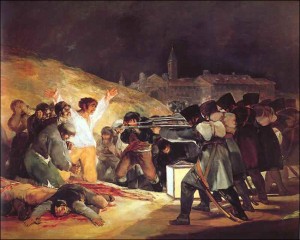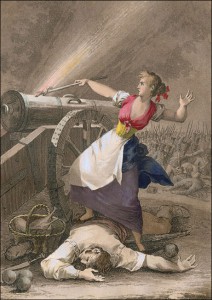All links are to Wikipedia entries.

The Third of May 1808: The Execution of the Defenders of Madrid by Francisco Goya, 1814. (Click on image to see a larger version and to read more about it.)
Government, Politics, and War:
- January 1: Sierra Leone becomes a British Crown Colony.
- January 22: The Bragança Portuguese Royal Family arrives in Brazil, running away from the French army. The colony becomes the seat of the Portuguese Empire.
- January 26: On the 20th anniversary of the foundation of the colony of New South Wales, disgruntled military officers of the New South Wales Corps (the Rum Corps) overthrow and imprison Governor William Bligh and seize control of the colony in the Rum Rebellion.
- February 2: French troops occupy the Papal States (Vatican).February 29: Napoleon drops the charade of a French-Spanish alliance, ordering French commanders to halt their marches and seize key Spanish fortresses at San Sebastian, Pamplona, Figuera, and Barcelona.
- March 19: Charles IV of Spain abdicates in favor of his son, Ferdinand VII.
- May 2: Madrid revolts against the French and a brutal retaliation sets in motion an eruption of uprisings across Spain. Full-scale war begins, forcing Napoleon to increase his military commitment in the Peninsula.
- May 3: The Madrid rebels who rose on May 2 are executed near Príncipe Pío Hill.
- June 6: Napoleon places his brother Joseph Bonaparte on the throne of Spain.
- June – August: The first Siege of Saragossa takes place as 12,000 French troops storm the city. After a long and bloody conflict throughout the summer against Spanish troops and intrepid citizens (including Agustina, Maid of Aragón, immortalized by Goya and Lord Byron) , the French are forced to retreat.
- July 22: The Battle of Bailén is a spectacular victory over the French by the Spanish General Castaños, resulting in the total collapse of Napoleon’s military machine in France. It was the first major setback in Napoleon’s unchecked imperialism.
- August 1: In response to the uprisings in Spain and Portugal, British forces under the command of Arthur Wellesley (the future Duke of Wellington) land in Portugal.
- August 17: Wellesley defeats the French under General Delaborde at the Battle of Roliça.
- August 21: Wellesley defeats the French under General Junot at the Battle of Vimiero.
- August: Napoleon names his brother-in-law Joachim Murat as King of Naples and Sicily (replacing his brother Joseph Bonaparte, who is now King of Spain).
- August 30: The Convention of Cintra is signed, in which the defeated French are allowed to evacuate Portugal without further conflict.
- September: The British government is outraged at the terms of the Cintra agreement, and all the generals, including Wellesley, are recalled to England for a Court of Inquiry. Sir John Moore is left in command of the 30,000 British troops still in Portugal.
- November: Napoleon personally leads his Grande Armée, 200,000 strong, into Spain, promising to conquer it. He routs the Spanish in a series of engagements in November.
- December: Sir John Moore leads 16,000 men toward Burgos with the ultimate goal of driving the French back into Spain, but is ordered to retreat when it is learned that Napoleon himself was advancing against him with 80,000 troops. The British begin a grim, hazardous retreat to Corunna.
- December 20: The Second Siege of Saragossa begins.
Literature, Journalism, and Publishing:
- Leigh Hunt becomes editor of the Examiner, a newspaper founded by his brother John Hunt.
- Walter Scott publishes his epic poem Marmion.
- July 20: Henry Crabb Robinson sends his first dispatches on the Peninsular War in Spain to The Times of London. He is the world’s first war correspondent.
Music:
- December 22: Beethoven conducts and performs in concert at the Theater an der Wien, Vienna, with the premiere of his Fifth Symphony, Sixth Symphony, Fourth Piano Concerto (performed by Beethoven himself) and Choral Fantasy (with Beethoven at the piano).
Theater and Dramatic Arts:
- Johann Wolfgang von Goethe’s drama Faust, Part 1 is published.
- December 20: The Theatre Royal, Covent Garden is destroyed by fire, along with most of the scenery, costumes, and scripts.
Science and Industry:
- Sir Humphrey Davy proves that electricity could produce heat or light between two electrodes separated in space and connected by an arc. His public demonstrations in London are extremely popular, and cause several women to swoon.
- The elements barium, calcium, magnesium, and strontium are isolated by Sir Humphry Davy.





